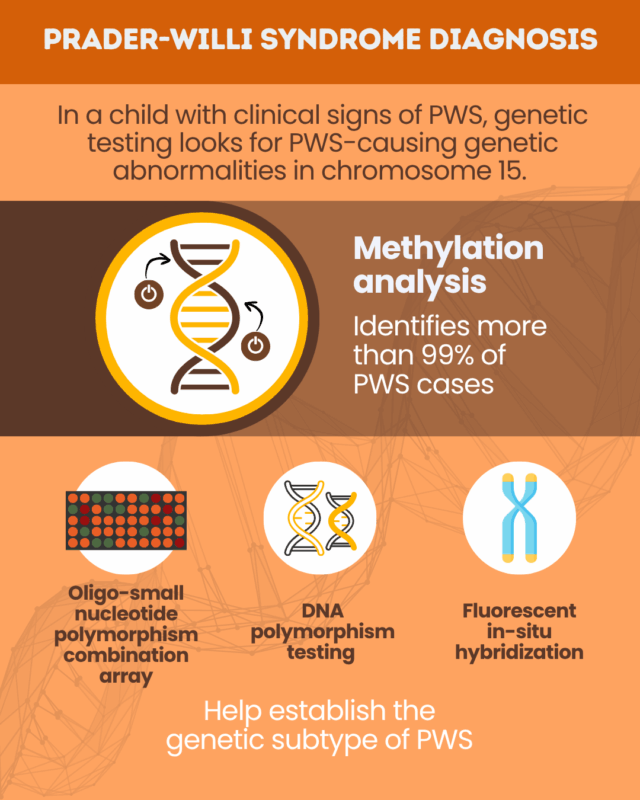 Discussion
Discussion
Prader-Willi syndrome diagnosis
Last updated Sept. 18, 2025, by Lindsey Shapiro, PhD

Reaching an early Prader-Willi syndrome (PWS) diagnosis enables the fastest possible start to appropriate PWS treatment and care.
A rare genetic disorder, PWS is caused by the loss of function of paternally inherited genes located in a specific region of chromosome 15. This leads to a wide range of PWS symptoms, such as low muscle tone, excessive hunger, behavioral issues, and intellectual disabilities.
If a child shows early signs of the condition and meets official diagnostic criteria based on clinical presentation, genetic testing for PWS will be done to establish the diagnosis.
Prader-Willi syndrome diagnosis criteria
PWS diagnosis criteria have changed over the years. At this time, having all prespecified symptoms for a given age group, from newborn to adult, is enough to justify genetic testing for PWS.
In the neonatal period, or the first 28 days of life, infants will show:
- low muscle tone, or hypotonia, with poor suck
Between 1 month and 2 years of age, babies will show:
- hypotonia with poor suck and appetite in the neonatal period
- developmental delay
Between ages 2 and 6, children will show:
- hypotonia with a history of poor suck
- developmental delay
Between 6 and 12 years of age:
- history of hypotonia with poor suck
- developmental delay
- excessive eating with abdominal obesity if uncontrolled externally
From age 13 years into adulthood, individuals will show:
- cognitive problems, usually mild intellectual disability
- excessive eating and uncontrolled hunger (hyperphagia), with abdominal obesity if uncontrolled externally
- hypogonadism, or little to no hormone production by the testicles or ovaries, and/or typical behavioral findings

Genetic testing
After clinical criteria are met, genetic tests will be done to look for abnormalities that affect a specific section, called the PWS locus, of the paternal chromosome 15 — the underlying PWS cause. Such findings will confirm the diagnosis of PWS.
The preferred initial method is a DNA methylation test, which is capable of detecting more than 99% of PWS cases from a blood sample. This test looks for a chemical modification to DNA, called methylation, that silences genes, and determines whether genes in the paternal PWS locus are absent or inactive.
There are three major genetic defects that can lead to this loss of gene activity: chromosome 15 deletions, uniparental disomy (UPD), and imprinting errors. While DNA methylation confirms the presence of PWS, it typically cannot distinguish the genetic defect, so other types of tests may also be run.
- An oligo-small nucleotide polymorphism combination array can detect a chromosome 15 deletion, many cases of UPD, and certain imprinting errors.
- DNA polymorphism testing can be done to identify certain cases of UPD and imprinting errors. This generally requires blood samples from the child and both parents.
- Fluorescent in-situ hybridization determines if a person has a chromosome 15 deletion. However, it cannot detect UPD or imprinting errors.
If all genetic PWS testing is negative, a Prader-Willi syndrome diagnosis is highly unlikely.
Prade-Willi Syndrome News is strictly a news and information website about the disease. It does not provide medical advice, diagnosis, or treatment. This content is not intended to be a substitute for professional medical advice, diagnosis, or treatment. Always seek the advice of your physician or other qualified health provider with any questions you may have regarding a medical condition. Never disregard professional medical advice or delay in seeking it because of something you have read on this website.
Recent Posts
- For rare disease families, February is a month of both love and awareness
- Muscle, bone signaling imbalances found in non-obese PWS children
- Most PWS patients meet nutrient targets but struggle with calorie control
- Adults with PWS need lifelong support in daily activities, study finds
- Celebrating a milestone in life with Prader-Willi syndrome
- New technique ‘wakes up’ silent genes in Prader-Willi in lab testing
- Probiotics may boost beneficial gut bacteria in Prader-Willi syndrome
- Avoiding meltdowns during the holidays with Prader-Willi syndrome
- PWS patients see weight loss, less hunger with setmelanotide in trial
- Eye-tracking test adapted to better measure hunger behaviors in PWS
Related articles
-
 Discussion
Discussion



